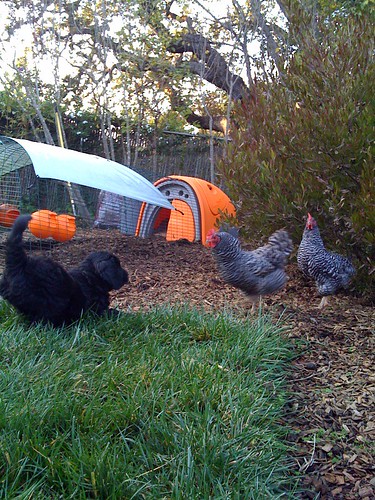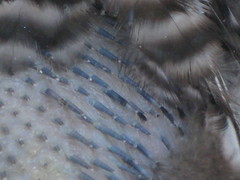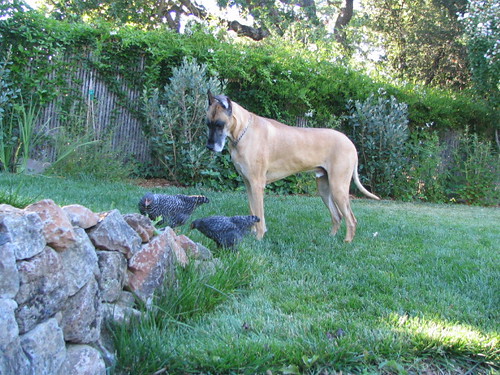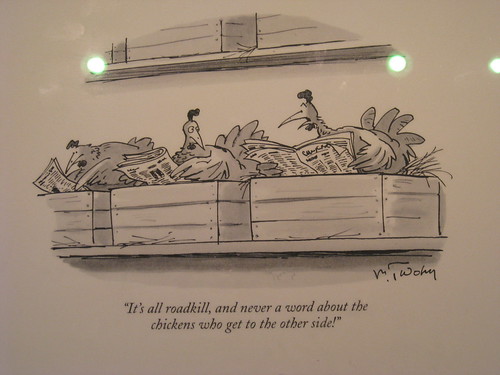We live in a typical urban neighborhood: lots of babies, kids and dogs contributing to the soundtrack of families growing up. The traffic is light, and we can hear the sounds of the Caltrain as it pulls into Redwood City station about a mile away. In all, it's a pretty quiet place with the few odd punctuations of nuisance sounds: sirens, loud car mufflers... our chickens.
It seems one of our chickens, Sophia, has fallen in love with the sound of her own voice. And I'm not talking about her soothing little cluck-cluck-cluck sound. I'm talking her alarmed-hen sound as if she's trying to warn others that some threat is near by: a loud "Caaaaaaaw!" And it's never just one Caaaaaw!, there's got to be a whole series of them one after the other after the other.
Depending on how much energy she's got, she could go on belting out a caw every 10 seconds or so for minutes on end before finally getting it out of her system. I've found I can help short-circuit these loud sessions by walking down to the coop let her see I'm near, but I'd rather not have her learn to call me to her coop by doing this.
And unlike prior fears that she was just making a ruckus because she's cooped up instead free-ranging the yard, Sophia's also stopped in the middle of the yard while I'm out there with her and raised her head up to belt out a couple CAAAAWs for no particular reason.
So I've learned to just let her go at it, even though it seems that about three mornings a week, just after dawn, she'll starting belting them out in the crisp morning air. No doubt to the extreme pleasure of our neighbors trying to sleep in. Heck, even I'm bothered by it some mornings.
Over the summer, we've noticed there are a couple dogs in the neighborhood that bark and bark and bark until past midnight. Laying awake in bed one night, after cursing the dogs I told my wife that I was sure
our chickens were going to get in trouble with the neighbors well before those dogs were hushed. And wouldn't you know I was right?
Last week, a city zoning inspector showed up unannounced at our door to check on our chickens. Left Coast Mom was the one home at the time to receive this visit, and she let him down into the backyard to show off the girls and even pulled out two eggs from the nest (thank goodness it was a double-egg day!) to underscore the point that we're well within code here in Redwood City (four hens per household, no roosters).
The inspector asked if the chickens fought with each other (no), if they had enough room (yes), regularly tended (yes).
And so we were deemed completely in compliance with code. Thank you. Have a nice day.
It's taken me so long to write this post because there are several issues this brings up and I'm still wrestling with how to deal with them:
- Why didn't the neighbor come knock on our door to talk to us about it first? Or is this the same passive aggressive person who left a note on our door about our own dog barking too much last summer (we got him an anti-bark collar after that). Wow, they must be going friggin nuts with the way those other dogs are carrying on at night this summer.
- Sure, our chickens are legal, but it seems they're a noise nuisance. I think part of why we got "busted" is the fact that folks aren't used to hearing chickens in their neighborhood (not just ours, but any neighborhood). In running down the list of "sounds you'll hear from your backyard" I don't think "chickens calling" makes the top 40 responses for most folks. It'll take a while to get used to the chickens being acknowledged as part of the 'hood
- What can I do to quiet my chickens? As mentioned above, Sophia's content to sound off whether she's inside the run or out free-ranging the yard. It seems like she's telling off the squirrels that run rampant around her or the jays or crows that fly over, but I can't tell the source of her perturbation. I really just think she likes the sound of her voice.
And finally, why is it that the dogs are getting the free ride where my chooks are not? There seems to be no consequence to their barking and barking and barking at all hours. As the Mrs was walking the city code inspector to the door after we scored our "meets code" rating, she asked if he was the same one who got called in to deal with incessantly barking dogs.
"No," he said, "for them you have to call the police."
Talk about busted!
 2008 has been a great year for us here at urbanchickens.net, both in the backyard and online. The chickens in our own backyard have been faithful layers all year long, and we seem to have survived our first molt relatively unscathed.
2008 has been a great year for us here at urbanchickens.net, both in the backyard and online. The chickens in our own backyard have been faithful layers all year long, and we seem to have survived our first molt relatively unscathed.


















